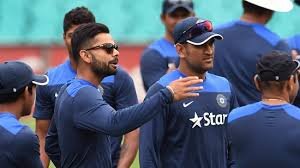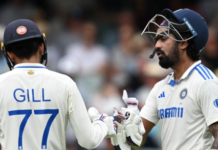
Virat Kohli is now widely seen as India’s greatest ever Test captain. While many Indian cricket fans admire legends like Sourav Ganguly and MS Dhoni, Kohli’s achievements in Test cricket set him apart. His leadership style, fitness standards, and success across all conditions make him a captain of a different class. When he took over the Test captaincy in 2014, the Indian team was going through changes. The Dhoni era in Tests had ended, and India needed a strong leader who could build a team that performs well not only in home matches but also in tough overseas tours. Kohli stepped into that role and completely changed the image of India as a Test-playing nation.
Kohli’s captaincy was marked by aggression and passion. He believed in fighting hard and always aiming for victory. Unlike previous captains, he was not afraid of losing if it meant chasing a win. He encouraged his team to be fit, disciplined, and always mentally prepared. Under his leadership, fitness became a priority, and players had to clear the Yo-Yo test to be eligible for selection. This raised the standard of the team’s athleticism and overall performance. His bold choices, like playing five bowlers or dropping senior players who were not in form, showed his fearless attitude. Kohli was not there to play safe — he was there to build a world-class team.
In terms of records, Virat Kohli has the best record among all Indian Test captains. He led India in 68 Tests and won 40 of them, giving him a win percentage of over 58%. No other Indian Test captain has managed this level of success. Under his leadership, India never lost a Test series at home. He also became the first Indian captain to win a Test series in Australia in 2018-19. That victory was a historic moment for Indian cricket and showed that Kohli’s team could win in conditions where Indian teams usually struggled. He also led India to the final of the World Test Championship in 2021, proving that the team was consistently at the top under his captaincy.
One of Kohli’s biggest contributions was the development of a strong fast bowling unit. In the past, India relied heavily on spin bowlers, especially at home. But Kohli believed that to win overseas, fast bowlers had to take charge. He backed bowlers like Jasprit Bumrah, Mohammed Shami, Ishant Sharma, and Umesh Yadav, and they delivered excellent performances in countries like Australia, England, and South Africa. This shift in strategy gave India the edge in foreign conditions, which was not the case earlier.
When we compare Kohli to MS Dhoni and Sourav Ganguly, we see different strengths. Dhoni was a cool and calm leader who won India the 2007 T20 World Cup, the 2011 ODI World Cup, and the 2013 Champions Trophy. However, his record in Test matches abroad was weak. India lost badly in England and Australia under Dhoni. Ganguly was a fearless leader who built the base for a strong team by backing young talent, especially after the match-fixing scandal in 2000. He gave chances to players like Sehwag, Yuvraj Singh, Zaheer Khan, and Harbhajan Singh. But even Ganguly didn’t achieve the kind of consistent success in Tests, especially away from home, that Kohli managed.
Virat Kohli’s overseas Test performances are another reason why he is considered the best Test captain. Before him, Indian captains often settled for a draw when playing abroad. Kohli wanted to win every match. The series win in Australia in 2018-19 was a clear message that India had arrived as a serious Test-playing side in all conditions. Even though he was not part of the second series win in Australia (2020-21), he had laid the foundation for such success by building a strong team culture. His leadership turned India into a side that was not afraid of any opponent, in any part of the world.
Kohli’s impact on the culture of Indian cricket is also very deep. He made fitness and discipline mandatory. Players had to train hard and stay in top shape to be part of the team. He also brought a sense of pride and hunger to the dressing room. Young players like Rishabh Pant, Shubman Gill, Hanuma Vihari, and Mohammed Siraj got their chances and improved under his leadership. Kohli always stood by his players when they were going through tough times, and his backing gave them confidence.
Despite all these positives, Kohli did face some criticism. Some people said he was too emotional or too aggressive on the field. Others felt he sometimes over-rotated bowlers or didn’t always make the right team selections. His exit as captain was also controversial, with reports of disagreements with the BCCI and selectors. But even his critics agree that his record and the transformation he brought to the Indian Test team are undeniable.
Kohli’s legacy as Test captain will be remembered for many reasons. He built the most successful Indian Test team in history. He made fast bowling a strength, something Indian cricket had never seen before. He created a culture of winning, fitness, and professionalism. And most importantly, he proved that India could not only dominate at home but also fight and win abroad. He raised the bar for what it means to be a successful Test captain.
Even after stepping down from captaincy, Kohli continues to lead by example with his batting, fitness, and attitude. His energy, passion, and commitment to Indian cricket remain as strong as ever. Young players still look up to him, and fans continue to support him as one of India’s greatest cricketing icons.To sum it up, while MS Dhoni and Sourav Ganguly played important roles in shaping Indian cricket, Virat Kohli’s contribution to Test cricket is unmatched. He is a leader who turned dreams into results. He changed the way the Indian team plays, especially in challenging overseas conditions. His win record, leadership style, and the belief he brought to Indian cricket make him India’s greatest ever Test captain. Kohli didn’t just lead the team — he redefined Indian Test cricket for the modern era.


































